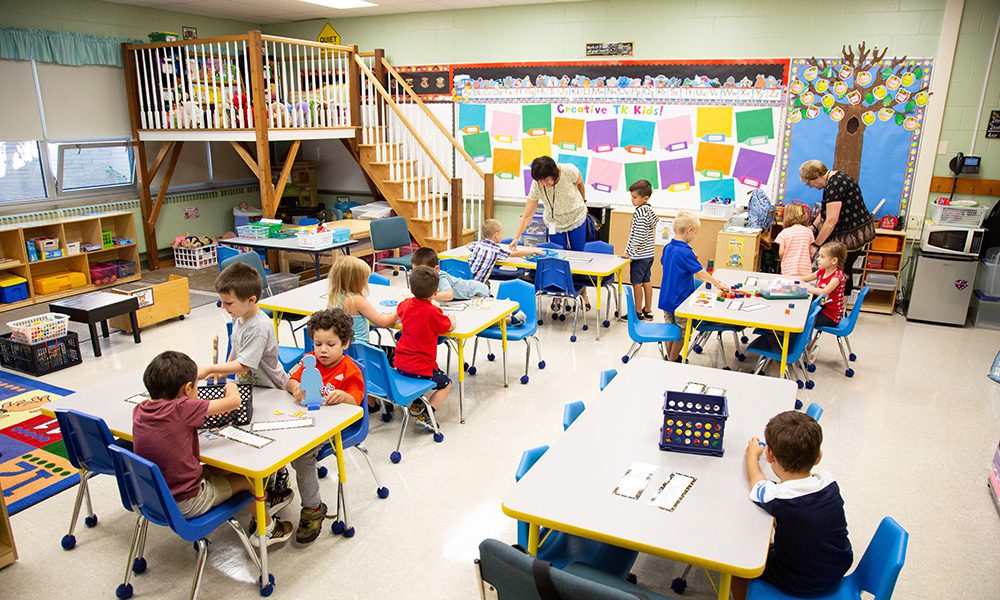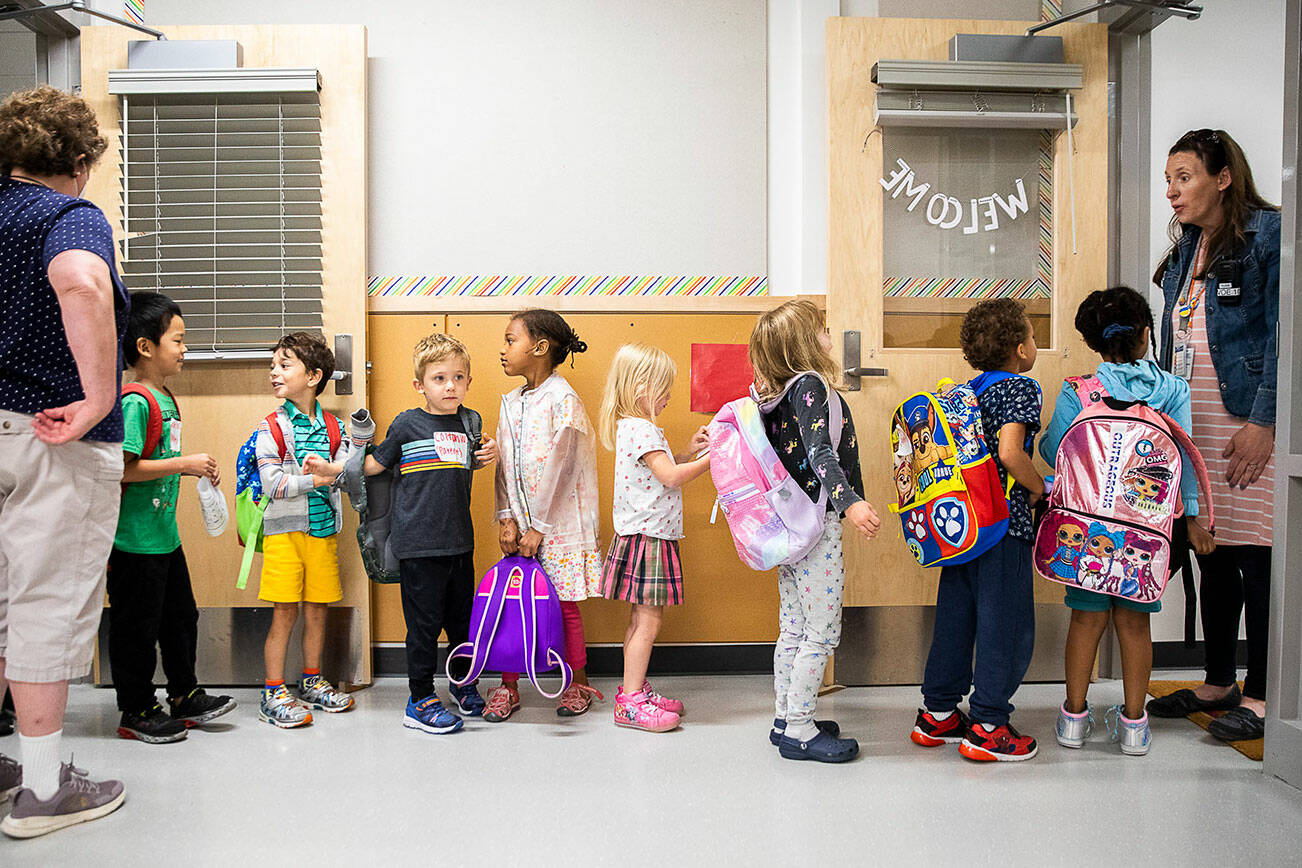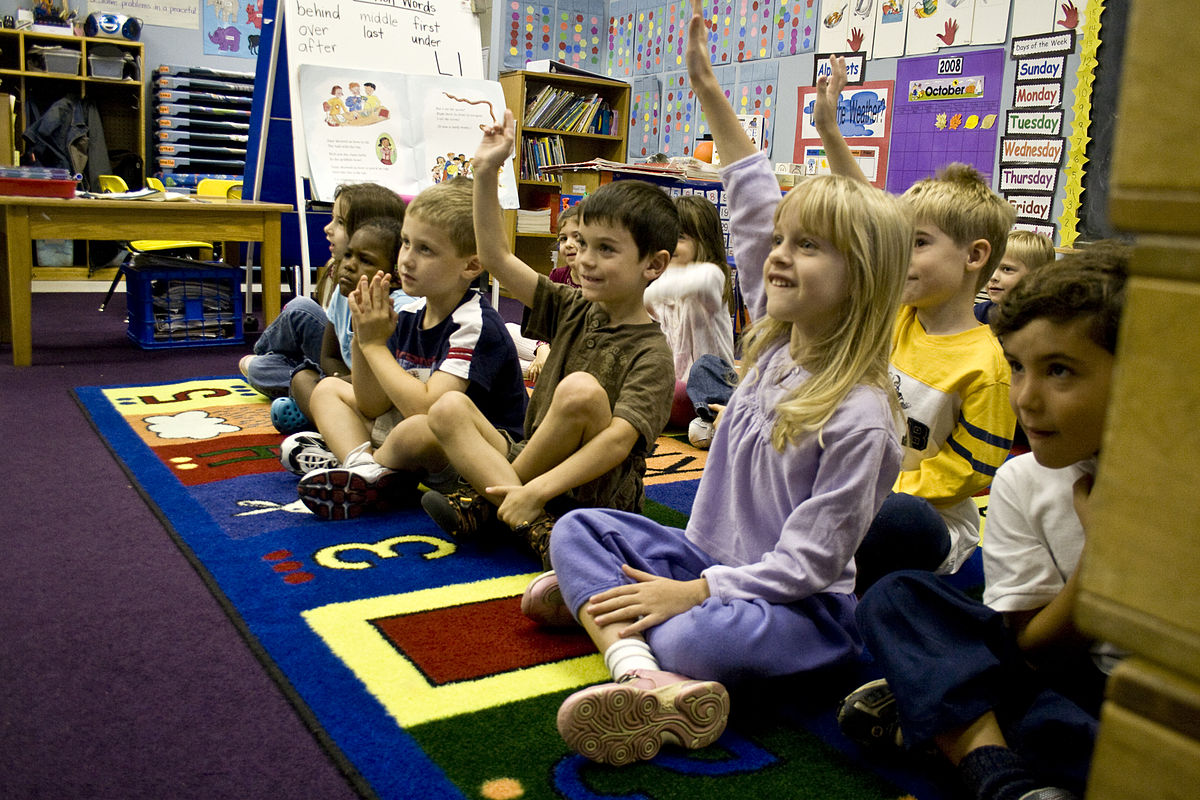How Kindergarten activities nurture early learning and social skills
Wiki Article
Elementary school: A Comprehensive Guide to Programs That Foster Learning and Growth
Quality college plays a crucial function in forming a youngster's future. It incorporates essential learning with social-emotional development. Various programs and techniques are used to satisfy varied requirements. The combination of modern technology and extracurricular activities boosts the academic experience. Understanding these components is necessary for promoting growth. What details approaches can schools implement to ensure every youngster thrives in this fundamental stage?Comprehending the Relevance of Very Early Education
While lots of identify the importance of education at any kind of stage, comprehending the importance of early education and learning is essential for setting a strong structure for lifelong knowing. Study suggests that very early childhood experiences greatly affect social and cognitive development. Throughout these developmental years, children are particularly receptive to finding out, making it crucial to give stimulating and nurturing environments. Quality early education and learning programs promote vital skills such as communication, problem-solving, and emotional guideline.Moreover, early education and learning can link voids in socio-economic variations, ensuring all children have access to the resources required for success. By emphasizing play-based learning and interactive activities, early education cultivates curiosity and a love for understanding. In addition, it sustains the advancement of crucial believing abilities that are important in later scholastic searches. Eventually, spending in early education and learning yields considerable long-lasting benefits, forming individuals that are better furnished for the obstacles of a progressively complex globe.
Standard Educational Program: A Time-Tested Strategy
Standard curricula have long prioritized core topics, giving trainees with necessary knowledge in locations such as math, language, and scientific research arts. This organized learning environment promotes self-control and consistency, enabling trainees to concentrate on foundational skills. Furthermore, teacher-led direction plays an essential duty in guiding students through the curriculum, making certain that learning goals are met efficiently.
Core Subjects Focus
Numerous instructional philosophies have actually emerged over the years, the focus on core topics within traditional educational program stays a keystone of grade college education. These core topics commonly consist of maths, reading, writing, science, and social research studies, forming the fundamental knowledge important for trainee advancement. By concentrating on these disciplines, typical educational program aim to gear up pupils with vital assuming abilities and a versatile understanding of the world. This structured approach fosters essential proficiency and numeracy skills, making it possible for trainees to involve meaningfully with more complex concepts later in their education. Furthermore, the proficiency of core subjects is often checked out as a crucial indication of academic success, more strengthening their relevance in elementary school discovering environments, and guaranteeing a consistent instructional baseline across diverse populations.Structured Discovering Environment
A structured understanding atmosphere is crucial for fostering scholastic development in quality school settings, as it gives a consistent structure within which trainees can prosper. Conventional curricula commonly emphasize clear expectations, schedules, and regimens, enabling pupils to develop a complacency and focus on their discovering. This predictability aids lessen disturbances and advertises discipline, making it possible for trainees to engage better with academic material. In addition, an organized atmosphere helps with the gradual intro of intricate ideas, making sure that foundational abilities are grasped prior to proceeding. Such a strategy not just supports cognitive growth however also supports social abilities, as students discover to browse their responsibilities within a defined system. Inevitably, a structured discovering environment prepares for long-lasting knowing behaviors.Teacher-Led Guideline
Teacher-led direction remains a foundation of conventional educational programs, supplying a direct and effective means of delivering academic material. This approach stresses the teacher's duty as an authority number and facilitator of understanding, assisting students with structured lessons and analyses. With an emphasis on direct instruction, teachers can make clear complex ideas, making certain that pupils understand fundamental abilities important for future understanding. This method frequently consists of using textbooks, lectures, and specific training strategies, which have been revealed to produce quantifiable academic outcomes. On top of that, teacher-led guideline fosters a regimented discovering setting, permitting regular surveillance of trainee progress. Regardless of the introduction of different instructional approaches, the effectiveness of teacher-led guideline proceeds to be confirmed by its long-lasting presence in educational settings.
Innovative Technology-Driven Understanding Programs
Numerous grade schools are accepting ingenious technology-driven discovering programs to boost educational results and involve pupils in meaningful means. These programs leverage devices such as interactive software, digital truth, and adaptive understanding systems, enabling individualized learning experiences customized to individual trainee requirements. By incorporating technology into the curriculum, educators can foster cooperation and vital thinking skills amongst students.Coding and robotics classes motivate analytic and creative thinking, while on the internet resources give access to a huge range of information. Additionally, gamified discovering applications make complicated subjects a lot more approachable, encouraging students to get involved actively in their education and learning.
Educators additionally gain from technology-driven programs through information analytics, which permit real-time analyses of trainee performance. This enables them to change their teaching approaches without delay. On the whole, these cutting-edge programs are changing conventional academic techniques, preparing students for a future where electronic proficiency is necessary.
Extracurricular Activities for Holistic Development
Integrating modern technology right into the academic landscape has actually opened brand-new methods for trainee engagement, but alternative growth extends beyond the classroom. After-school activities play a vital function in fostering well-shaped growth amongst elementary school trainees. These tasks, ranging from sports and arts to clubs and offering, give chances for youngsters to discover their interests and create necessary life skills.

Participation in sporting activities urges teamwork, technique, and physical conditioning, while artistic quests stimulate imagination and self-expression. Academic clubs advertise important thinking and cooperation, allowing students to use classroom understanding in real-world contexts. Offering instills a sense of neighborhood and social duty, enriching pupils' understanding of diverse viewpoints.
Social-Emotional Learning: Structure Strength and Empathy
While scholastic accomplishment is essential, social-emotional understanding (SEL) plays a crucial function in supporting durability and compassion in elementary school pupils. SEL programs aim to establish crucial abilities such as self-awareness, emotional regulation, and interpersonal interaction, which are essential for students' overall wellness. By engaging in tasks that promote understanding of feelings and social dynamics, trainees learn to browse difficulties and build healthy partnerships.Incorporating SEL right into the educational program cultivates a helpful setting where kids can share their feelings and find out to feel sorry for others. This strategy not only boosts emotional intelligence however likewise assists trainees handle obstacles, advertising durability. Research shows that pupils that take part in SEL initiatives show enhanced habits, academic efficiency, and positive peer communications. Subsequently, integrating social-emotional discovering into elementary school programs is necessary for gearing up students with the skills needed for personal and scholastic success, eventually forming compassionate and durable individuals.
Unique Education And Learning Programs: Sustaining Diverse Learners
Special education programs play a vital function in supporting varied learners within quality college setups. Via customized education plans (IEPs) and comprehensive class approaches, these programs intend to fulfill the special needs of each pupil. Reliable application fosters an atmosphere where all children can flourish academically and socially.Individualized Education And Learning Strategies
Embellished Education And Learning Plans (IEPs) act as essential tools in the area of unique education and learning, developed to sustain varied learners with one-of-a-kind requirements. These lawfully binding records outline particular educational objectives, lodgings, and services tailored to every pupil. Developed collaboratively by teachers, professionals, and parents, IEPs ensure that pupils with handicaps have accessibility to a free ideal public education (FAPE) This customized approach promotes significant development by attending to private staminas and challenges. Normal evaluations and updates to the IEP facilitate continuous adjustments, guaranteeing that instructional techniques remain effective. Ultimately, IEPs equip trainees by fostering a comprehensive knowing atmosphere that acknowledges and values their uniqueness, allowing them to flourish academically and socially.Inclusive Classroom Strategies
Developing an inclusive class atmosphere is essential for effectively sustaining varied students, as it cultivates collaboration and involvement among students of varying capacities (Kindergarten). Inclusive class methods entail set apart guideline, where educators adjust lessons to meet private requirements. This might consist of diverse mentor approaches, such as visual help, hands-on tasks, and modern technology integration. Furthermore, advertising peer support through cooperative knowing groups motivates trainees to help each other, enhancing social abilities and empathy. Using universal layout principles assures that all analyses and materials are obtainable. Teachers must additionally carry out regular regimens and clear expectations to produce a foreseeable atmosphere. By prioritizing inclusivity, educators can grow a positive atmosphere that values diversity and empowers every student to prosper academically and sociallyParental Participation: Enhancing the Educational Experience
While several factors add to a kid's educational success, parental participation sticks out as a vital element in boosting the total discovering experience. Study shows that youngsters whose moms and dads proactively participate in their education often tend to carry out far better academically and show boosted behavior in school. This participation can take different types, including going to parent-teacher meetings, volunteering in classrooms, or supporting research regimens.Moreover, effective communication between moms and dads and teachers fosters a collective setting that profits pupils. When teachers and parents collaborate, they can recognize and attend to difficulties much more swiftly and properly. In addition, adult assistance motivates youngsters to value education, instilling a growth way of thinking that promotes long-lasting learning.
Regularly Asked Concerns
How Can I Select the Right Elementary School for My Child?
To pick the ideal quality school, moms and dads need to analyze academic performance, extracurricular offerings, educator credentials, institution culture, and area. Seeking and visiting schools comments from various other moms and dads can additionally help in making an educated choice.What Are the Costs Connected With Grade College Programs?
The costs connected with quality college programs differ widely, including tuition fees, materials, after-school activities, and transportation. Households must also take into consideration added expenses such as uniforms and possible fundraising payments for boosted educational experiences.Exactly How Do Quality Schools Assess Student Development and Performance?
Elementary Grade School school evaluate pupil progress and performance via a combination of standardized tests, educator assessments, classroom participation, and project-based assignments. Kindergarten. These techniques supply insights into specific learning, ability development, and total scholastic successExist Options for Homeschooling Within Typical Quality School Frameworks?
Yes, several typical elementary school offer options for homeschooling with hybrid programs, permitting pupils to discover in your home while taking part in select school activities or classes, providing versatility and individualized education within an organized framework.What Is the Function of Educators in Fostering Student Imagination?
Educators play a necessary function in promoting trainee creativity by motivating expedition, giving varied products, and developing a safe environment for expression. Their support inspires students to think critically and create ingenious concepts through collective discovering experiences.A structured knowing setting is important for promoting academic development in grade college setups, as it provides a regular structure within which students can grow. With a focus on direct direction, teachers can make clear complex concepts, making sure that trainees comprehend foundational skills necessary for future understanding. In enhancement, teacher-led direction promotes a disciplined knowing setting, enabling for consistent monitoring of student progress. Various quality institutions are accepting cutting-edge technology-driven knowing programs to boost academic outcomes and involve trainees in significant means. While academic success is essential, social-emotional discovering (SEL) plays a crucial function in nurturing strength and compassion in quality college trainees.
Report this wiki page